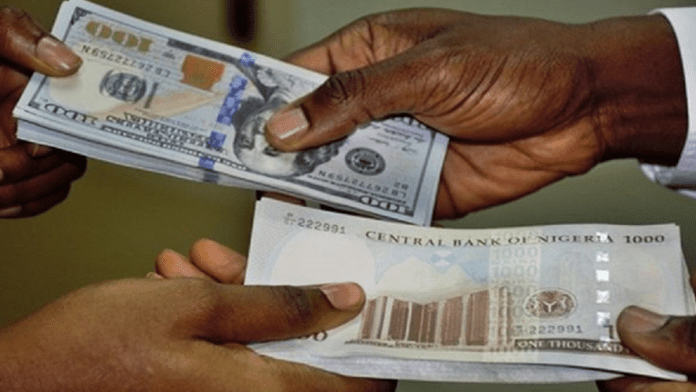The naira weakened on Nigeria’s parallel market Sunday, with black market dealers quoting the dollar at 1,485 to 1,500 naira, widening the gap between street rates and official channels. While the Nigerian Foreign Exchange Market held steady in the mid-1,400s, the persistent spread reflects underlying challenges that the Central Bank’s recent reforms have yet to fully resolve.
The divergence between official and informal markets reveals a familiar dynamic. The Central Bank of Nigeria has not recognised the parallel market officially, yet it remains the primary recourse for transactions requiring speed or avoiding bureaucratic delays. Banks and authorised FX windows source dollars differently from street dealers, and limited supplies in some official channels often push buyers to the parallel market.
For importers and small businesses, the practical impact proves immediate. Those needing dollars quickly must pay the premium rates quoted on the street, raising their landed costs and squeezing already thin margins. These higher foreign exchange costs may be passed on, potentially pressuring the prices of imported goods for consumers.
The Central Bank has undertaken substantial reforms aimed at narrowing this gap. The CBN recently injected $360 million through authorised dealers into the market to help mitigate depreciation amid resurgent demand pressures. Earlier this year, the naira exchanged at approximately 1,599 naira per dollar at the official window while the local currency exchanged at 1,600 naira per dollar, representing a mere one naira gap between both rates.
Yet Sunday’s parallel market quote suggests recent momentum may be weakening. A combination of global and domestic factors, coupled with intermittent central bank intervention, is contributing to the wide trading range. Oil price fluctuations remain a critical variable, with international crude prices directly influencing dollar inflows into Nigeria’s economy.
The CBN’s policy architecture addresses this challenge through multiple channels. The apex bank introduced the Electronic Foreign Exchange Matching System (EFEMS), which has proven effective in other economies in enhancing the functionality of the foreign exchange market and checking forex market distortions. Additionally, in January 2025, the CBN issued the Nigeria Foreign Exchange Code to promote the integrity and functioning of the wholesale Nigerian FX market, ensuring compliance with best practices from leading jurisdictions.
Yet structural limitations persist. Nigeria is largely an import-dependent nation and consistently faces high demand for dollars from imports, travel, education, and commercial activities. The Central Bank of Nigeria’s supply has never been enough to cool down the market or meet the increasing demand, consequently forcing Nigerians and business entities to keep patronising the parallel market.
The pressure on the naira reflects broader economic dynamics. Analysts warn that persistent inflation, pegged at 22.5 per cent year-on-year, and Nigeria’s ballooning import bill could exert downward pressure on the naira in the coming weeks. Food prices have surged 25 per cent amid forex shortages that have jacked up costs for essentials like rice and fuel.
Yet there are countervailing forces. Forex inflows are diversifying Nigeria’s forex sources beyond oil, with large funds coming from diaspora remittances and export proceeds. A $100 remittance, for instance, now yields approximately 147,500 naira at parallel rates, meaningful income for families depending on diaspora support.
For everyday Nigerians, the practical advice remains unchanged. Remittance recipients and travellers are advised to compare official bank rates and cash street quotes, as official windows can be cheaper, but access and timing are critical considerations. Those seeking large dollar quantities face real choices about timing and channel selection, with each carrying trade-offs between rate and accessibility.
The CBN’s recent interventions have prevented sharper depreciation, yet the persistence of meaningful gaps between official and parallel rates underscores how quickly confidence can shift when global oil prices wobble or domestic demand surges. The agency’s success will ultimately depend on whether the CBN can sustain dollar inflows through policy discipline while diversifying forex sources beyond crude oil export proceeds that remain vulnerable to international price volatility.
Source: newsghana.com.gh











